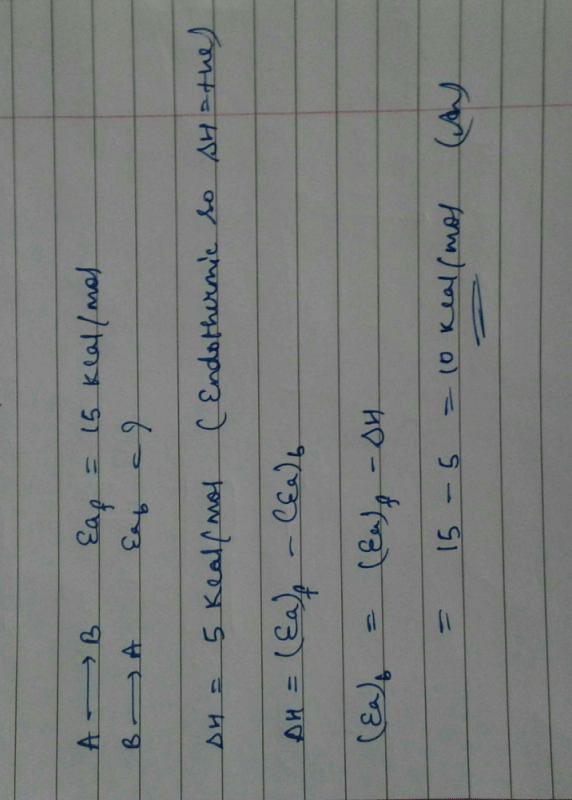Class 12 Exam > Class 12 Questions > An endothermic reaction A to B has an activat...
Start Learning for Free
An endothermic reaction A to B has an activation energy 15 kcal/mole and the heat of reaction is 5 kcal/mole.The activation energy of the reaction B to A is?
Most Upvoted Answer
An endothermic reaction A to B has an activation energy 15 kcal/mole a...
Activation Energy of Reaction B to A
Introduction
In this problem, we are given the activation energy and heat of reaction for a reaction from A to B and are asked to find the activation energy for the reverse reaction from B to A.
Explanation
For an endothermic reaction, the heat of reaction is positive, and energy is absorbed from the surroundings. The activation energy is the minimum amount of energy required for the reactant molecules to overcome the energy barrier and form the products.
According to the principle of microscopic reversibility, the activation energy for the reverse reaction is equal to the activation energy for the forward reaction. Therefore, the activation energy for the reaction B to A is also 15 kcal/mole.
The heat of reaction for the reverse reaction can be calculated using Hess's law, which states that the change in enthalpy for a reaction is the same regardless of the route taken from reactants to products. The heat of reaction for B to A is equal in magnitude but opposite in sign to that of A to B, which is -5 kcal/mole. Therefore, the heat of reaction for B to A is +5 kcal/mole.
Conclusion
In summary, the activation energy for the reaction B to A is 15 kcal/mole, and the heat of reaction is +5 kcal/mole.
Community Answer
An endothermic reaction A to B has an activation energy 15 kcal/mole a...


|
Explore Courses for Class 12 exam
|

|
Similar Class 12 Doubts
An endothermic reaction A to B has an activation energy 15 kcal/mole and the heat of reaction is 5 kcal/mole.The activation energy of the reaction B to A is?
Question Description
An endothermic reaction A to B has an activation energy 15 kcal/mole and the heat of reaction is 5 kcal/mole.The activation energy of the reaction B to A is? for Class 12 2024 is part of Class 12 preparation. The Question and answers have been prepared according to the Class 12 exam syllabus. Information about An endothermic reaction A to B has an activation energy 15 kcal/mole and the heat of reaction is 5 kcal/mole.The activation energy of the reaction B to A is? covers all topics & solutions for Class 12 2024 Exam. Find important definitions, questions, meanings, examples, exercises and tests below for An endothermic reaction A to B has an activation energy 15 kcal/mole and the heat of reaction is 5 kcal/mole.The activation energy of the reaction B to A is?.
An endothermic reaction A to B has an activation energy 15 kcal/mole and the heat of reaction is 5 kcal/mole.The activation energy of the reaction B to A is? for Class 12 2024 is part of Class 12 preparation. The Question and answers have been prepared according to the Class 12 exam syllabus. Information about An endothermic reaction A to B has an activation energy 15 kcal/mole and the heat of reaction is 5 kcal/mole.The activation energy of the reaction B to A is? covers all topics & solutions for Class 12 2024 Exam. Find important definitions, questions, meanings, examples, exercises and tests below for An endothermic reaction A to B has an activation energy 15 kcal/mole and the heat of reaction is 5 kcal/mole.The activation energy of the reaction B to A is?.
Solutions for An endothermic reaction A to B has an activation energy 15 kcal/mole and the heat of reaction is 5 kcal/mole.The activation energy of the reaction B to A is? in English & in Hindi are available as part of our courses for Class 12.
Download more important topics, notes, lectures and mock test series for Class 12 Exam by signing up for free.
Here you can find the meaning of An endothermic reaction A to B has an activation energy 15 kcal/mole and the heat of reaction is 5 kcal/mole.The activation energy of the reaction B to A is? defined & explained in the simplest way possible. Besides giving the explanation of
An endothermic reaction A to B has an activation energy 15 kcal/mole and the heat of reaction is 5 kcal/mole.The activation energy of the reaction B to A is?, a detailed solution for An endothermic reaction A to B has an activation energy 15 kcal/mole and the heat of reaction is 5 kcal/mole.The activation energy of the reaction B to A is? has been provided alongside types of An endothermic reaction A to B has an activation energy 15 kcal/mole and the heat of reaction is 5 kcal/mole.The activation energy of the reaction B to A is? theory, EduRev gives you an
ample number of questions to practice An endothermic reaction A to B has an activation energy 15 kcal/mole and the heat of reaction is 5 kcal/mole.The activation energy of the reaction B to A is? tests, examples and also practice Class 12 tests.

|
Explore Courses for Class 12 exam
|

|
Signup for Free!
Signup to see your scores go up within 7 days! Learn & Practice with 1000+ FREE Notes, Videos & Tests.



















